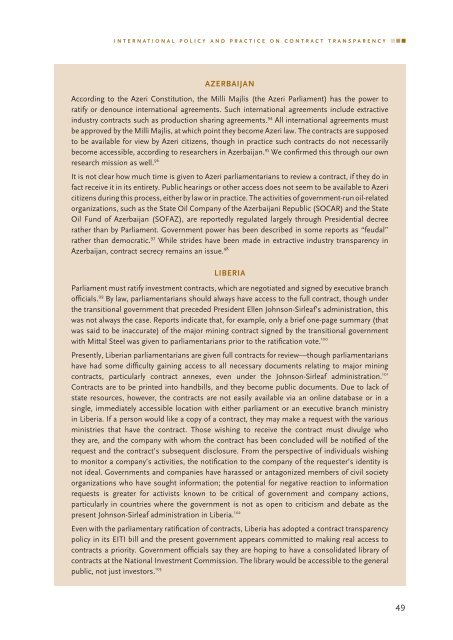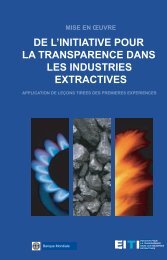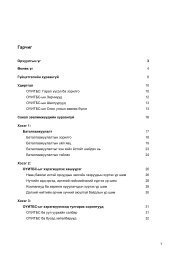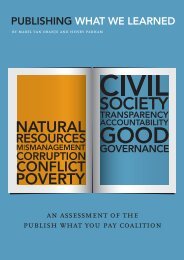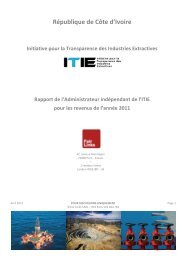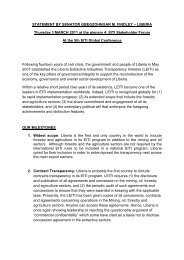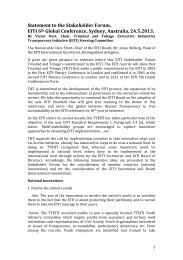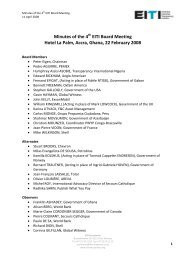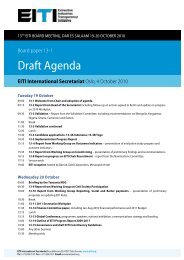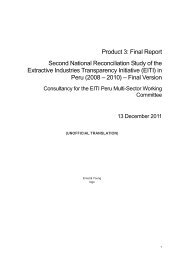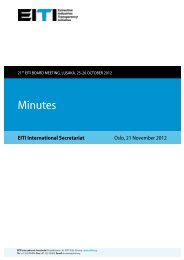CONTRACTS CONFIDENTIAL: - Good Law and Practice
CONTRACTS CONFIDENTIAL: - Good Law and Practice
CONTRACTS CONFIDENTIAL: - Good Law and Practice
Create successful ePaper yourself
Turn your PDF publications into a flip-book with our unique Google optimized e-Paper software.
INTERNATIONAL POLICY AND PRACTICE ON CONTRACT TRANSPARENCY<br />
AZERBAIJAN<br />
According to the Azeri Constitution, the Milli Majlis (the Azeri Parliament) has the power to<br />
ratify or denounce international agreements. Such international agreements include extractive<br />
industry contracts such as production sharing agreements. 94 All international agreements must<br />
be approved by the Milli Majlis, at which point they become Azeri law. The contracts are supposed<br />
to be available for view by Azeri citizens, though in practice such contracts do not necessarily<br />
become accessible, according to researchers in Azerbaijan. 95 We confirmed this through our own<br />
research mission as well. 96<br />
It is not clear how much time is given to Azeri parliamentarians to review a contract, if they do in<br />
fact receive it in its entirety. Public hearings or other access does not seem to be available to Azeri<br />
citizens during this process, either by law or in practice. The activities of government-run oil-related<br />
organizations, such as the State Oil Company of the Azerbaijani Republic (SOCAR) <strong>and</strong> the State<br />
Oil Fund of Azerbaijan (SOFAZ), are reportedly regulated largely through Presidential decree<br />
rather than by Parliament. Government power has been described in some reports as “feudal”<br />
rather than democratic. 97 While strides have been made in extractive industry transparency in<br />
Azerbaijan, contract secrecy remains an issue. 98<br />
LIBERIA<br />
Parliament must ratify investment contracts, which are negotiated <strong>and</strong> signed by executive branch<br />
officials. 99 By law, parliamentarians should always have access to the full contract, though under<br />
the transitional government that preceded President Ellen Johnson-Sirleaf’s administration, this<br />
was not always the case. Reports indicate that, for example, only a brief one-page summary (that<br />
was said to be inaccurate) of the major mining contract signed by the transitional government<br />
with Mittal Steel was given to parliamentarians prior to the ratification vote. 100<br />
Presently, Liberian parliamentarians are given full contracts for review—though parliamentarians<br />
have had some difficulty gaining access to all necessary documents relating to major mining<br />
contracts, particularly contract annexes, even under the Johnson-Sirleaf administration. 101<br />
Contracts are to be printed into h<strong>and</strong>bills, <strong>and</strong> they become public documents. Due to lack of<br />
state resources, however, the contracts are not easily available via an online database or in a<br />
single, immediately accessible location with either parliament or an executive branch ministry<br />
in Liberia. If a person would like a copy of a contract, they may make a request with the various<br />
ministries that have the contract. Those wishing to receive the contract must divulge who<br />
they are, <strong>and</strong> the company with whom the contract has been concluded will be notified of the<br />
request <strong>and</strong> the contract’s subsequent disclosure. From the perspective of individuals wishing<br />
to monitor a company’s activities, the notification to the company of the requester’s identity is<br />
not ideal. Governments <strong>and</strong> companies have harassed or antagonized members of civil society<br />
organizations who have sought information; the potential for negative reaction to information<br />
requests is greater for activists known to be critical of government <strong>and</strong> company actions,<br />
particularly in countries where the government is not as open to criticism <strong>and</strong> debate as the<br />
present Johnson-Sirleaf administration in Liberia. 102<br />
Even with the parliamentary ratification of contracts, Liberia has adopted a contract transparency<br />
policy in its EITI bill <strong>and</strong> the present government appears committed to making real access to<br />
contracts a priority. Government officials say they are hoping to have a consolidated library of<br />
contracts at the National Investment Commission. The library would be accessible to the general<br />
public, not just investors. 103<br />
49


